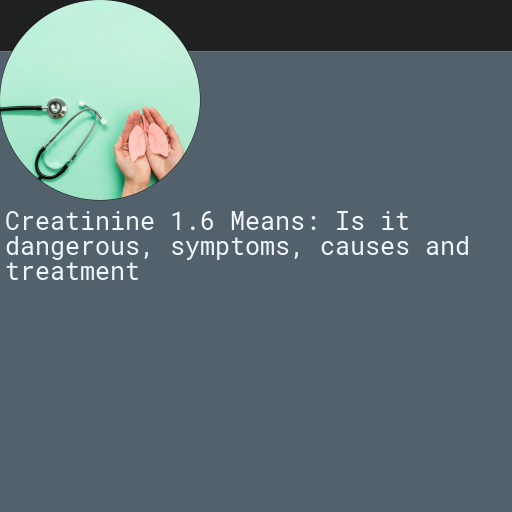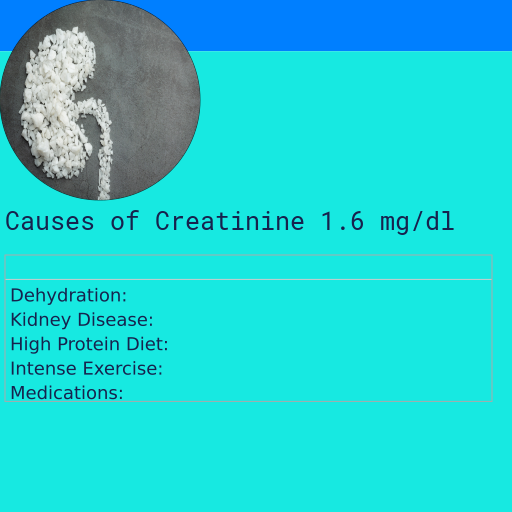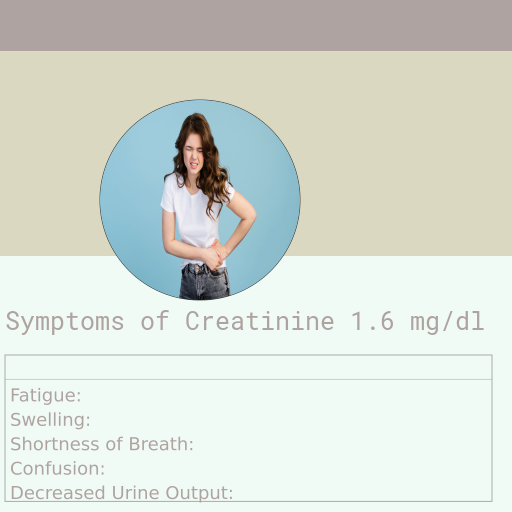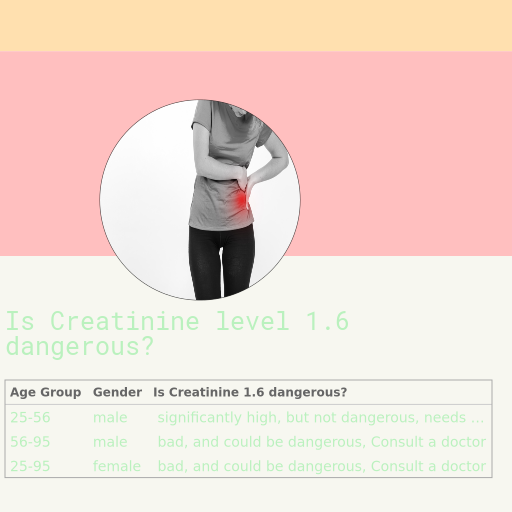Creatinine 1.6 : Is it Dangerous, Causes, Symptoms and More
Understanding the significance of creatinine levels in your blood is crucial for maintaining optimal health. Creatinine is a waste product generated from muscle metabolism, and its levels are a key indicator of kidney function. Elevated creatinine levels, such as a reading of 1.6 mg/dL, can be a cause for concern, potentially signaling underlying health issues. This blog delves into the dangers of high creatinine levels, exploring their causes, associated symptoms, and the various treatment options available to manage and reduce these levels effectively.

What is Creatinine
Creatinine is a byproduct of protein breakdown that serves no functional purpose in the body. As a waste product, it is produced by muscle metabolism and excreted by the kidneys. Since it has no use in the body, maintaining proper creatinine levels is crucial, as elevated levels can indicate potential kidney dysfunction or other underlying health issues. Monitoring creatinine levels helps in assessing kidney health and ensuring that the body efficiently disposes of metabolic waste.
- Muscle Metabolism: Creatinine is a byproduct of the normal breakdown of muscle tissue.
- Dietary Intake: Consuming large amounts of meat can increase creatinine levels, as muscle tissue contains creatinine.
- Exercise: Intense physical activity can temporarily raise creatinine levels due to increased muscle metabolism.
- Kidney Function: Reduced kidney function can lead to higher creatinine levels, as the kidneys are responsible for filtering creatinine from the blood.
- Medications: Certain drugs, such as nonsteroidal anti-inflammatory drugs (NSAIDs), can affect creatinine levels.
- Dehydration: Lack of adequate water intake can concentrate creatinine in the blood, raising its levels.
- Supplements: Creatine supplements, often used to enhance athletic performance, can increase creatinine production.
Normal Range of Creatinine in Adults
In adults, the normal range of creatinine levels typically falls between 0.6 to 1.2 milligrams per deciliter (mg/dL) for men and 0.5 to 1.1 mg/dL for women. These values can vary slightly depending on factors such as age, muscle mass, and overall health. Maintaining creatinine levels within this range is crucial for ensuring proper kidney function, as elevated levels can indicate potential kidney issues or other underlying health problems.
| Age Group | Normal Creatinine Range (mg/dL) |
|---|---|
| Children (0-12 years) | 0.3 - 1.0 |
| Adolescents (13-19 years) | 0.5 - 1.2 |
| Adults (20-59 years) | 0.6 - 1.3 |
| Older Adults (60+ years) | 0.6 - 1.2 |
Causes of Creatinine 1.6
Elevated creatinine levels can be a cause for concern as they often indicate underlying health issues. Creatinine is a waste product produced by muscle metabolism and is usually filtered out by the kidneys. When the kidneys are not functioning properly, creatinine levels can rise. Common causes of elevated creatinine include chronic kidney disease, dehydration, and certain medications that affect kidney function. Additionally, conditions such as diabetes and high blood pressure can also contribute to increased creatinine levels. Understanding these causes is crucial for effective management and treatment.
- Dehydration: Lack of adequate fluids can lead to an increase in creatinine levels.
- Kidney Disease: Chronic kidney disease or acute kidney injury can impair kidney function, causing creatinine to build up in the blood.
- High Protein Diet: Consuming a diet high in protein can elevate creatinine levels.
- Intense Exercise: Vigorous physical activities can cause temporary spikes in creatinine due to muscle breakdown.
- Medications: Certain drugs, such as nonsteroidal anti-inflammatory drugs (NSAIDs) and some antibiotics, can affect kidney function and raise creatinine levels.
- Diabetes: Poorly managed diabetes can lead to kidney damage, resulting in elevated creatinine.
- High Blood Pressure: Hypertension can damage the kidneys over time, leading to increased creatinine levels.
- Rhabdomyolysis: A condition involving the breakdown of muscle tissue can release creatinine into the bloodstream.

Symptoms of Creatinine 1.6
When it comes to understanding the implications of elevated creatinine levels, recognizing the symptoms is crucial. Elevated creatinine can be a sign of underlying kidney issues and may manifest through various symptoms. Common indicators include fatigue, swelling in the extremities, changes in urination patterns, and even shortness of breath. These symptoms can often be subtle, making it important to pay attention to your body's signals and seek medical advice if you notice any unusual changes.
- Fatigue: Feeling unusually tired or weak.
- Swelling: Noticeable swelling, especially in the legs, ankles, or feet.
- Shortness of Breath: Difficulty in breathing normally.
- Confusion: Experiencing confusion or difficulty concentrating.
- Decreased Urine Output: Producing less urine than usual.
- Dark-Colored Urine: Urine that is darker than normal.
- Nausea: Feeling nauseous or experiencing stomach discomfort.
- High Blood Pressure: Elevated blood pressure levels.

Dangers of Creatinine 1.6
When discussing creatinine levels, it's important to understand that creatinine itself does not directly harm the body. However, elevated creatinine levels can be a warning sign of underlying health issues such as kidney failure or other renal problems. These elevated levels indicate that the kidneys are not effectively filtering waste products from the blood. While creatinine may not cause harm, other waste products like urea can accumulate and lead to serious health complications, including cardiovascular issues and electrolyte imbalances. Monitoring creatinine levels is crucial as it helps in identifying and addressing these potentially dangerous conditions early on.
- Kidneys: Elevated creatinine levels often indicate impaired kidney function, potentially leading to chronic kidney disease or kidney failure if untreated.
- Heart: High creatinine can be associated with an increased risk of cardiovascular diseases such as hypertension and heart failure.
- Liver: An imbalance in creatinine levels can imply liver dysfunction, as the liver plays a role in metabolizing creatinine.
- Muscles: Prolonged elevated creatinine might indicate muscle damage or disorders such as rhabdomyolysis, where muscle fibers break down and release their contents into the bloodstream.
- Brain: High levels of creatinine can cause neurological symptoms including confusion, seizures, or encephalopathy.
- Digestive System: Problems with creatinine can lead to gastrointestinal issues such as nausea, vomiting, and loss of appetite.
- Skin: Elevated creatinine levels can cause skin problems like itching and a build-up of urea in the skin, leading to dryness or rashes.
- Immune System: Chronic high creatinine may weaken the immune response, making the body more susceptible to infections and diseases.
Home remedies for Creatinine 1.6
Disclaimer: Elevated creatinine levels should not be treated at home without professional guidance. While basic supportive care can help manage symptoms, it is crucial to consult a healthcare provider for a proper diagnosis and treatment plan. Supportive care might include staying well-hydrated by drinking plenty of water, maintaining a balanced diet low in protein, and avoiding strenuous activities that can strain the kidneys. Remember, these measures are not substitutes for professional medical advice and treatment.
- Stay Hydrated: Drinking plenty of water helps the kidneys flush out toxins and manage creatinine levels.
- Follow a Low-Protein Diet: Reducing protein intake can help lower the workload on your kidneys, preventing further increase in creatinine levels.
- Avoid Heavy Exercise: Intense physical activities can cause muscle breakdown, which might increase creatinine levels. Opt for moderate exercise like walking.
- Monitor Blood Pressure: Keeping your blood pressure in check is crucial for kidney health. Use home monitors to track your levels regularly.
- Limit Salt Intake: Excessive salt can lead to high blood pressure and strain your kidneys. Aim for a diet low in sodium.
Treatment for Creatinine 1.6
When a creatinine level of 1.6 is detected, medical treatment by a doctor is required to address the underlying causes and stabilize kidney function. The primary treatment goals include stabilizing kidney function, which may involve adjusting medications to reduce the workload on the kidneys. It's crucial to stop harmful drugs that could be exacerbating the condition and to identify if any medications are contributing to elevated creatinine levels. Additionally, treating any infections that may be present is essential, as infections can further impair kidney function. These steps are vital to preventing further deterioration and promoting kidney health.
- Hydration: Increasing fluid intake can help dilute creatinine levels in the blood and promote kidney health.
- Medications: Doctors may prescribe medications to manage underlying conditions such as hypertension or diabetes, which can contribute to elevated creatinine levels.
- Dietary Modifications: A diet low in protein, sodium, and potassium can alleviate stress on the kidneys and help manage creatinine levels.
- Regular Monitoring: Frequent check-ups and blood tests are essential to monitor creatinine levels and adjust treatment plans as needed.
- Lifestyle Changes: Incorporating regular exercise, avoiding smoking, and limiting alcohol consumption can improve overall kidney function and reduce creatinine levels.
GFR with Creatinine of 1.6
The concept of Glomerular Filtration Rate (GFR) is crucial when discussing kidney health. While a creatinine level of 1.6 might raise concerns, it is essential to understand that the absolute value of creatinine doesn't provide a complete picture. GFR, on the other hand, measures how well your kidneys are filtering blood, offering a more comprehensive assessment of kidney function. Factors such as age, sex, and body size influence GFR, making it a more relevant indicator of renal health than creatinine levels alone. By evaluating GFR, healthcare providers can more accurately diagnose and monitor kidney disease, ensuring timely and appropriate treatment.
| GFR Grade | GFR Range (mL/min/1.73 m²) | Description |
|---|---|---|
| G1 | > 90 | Normal or high |
| G2 | 60 - 89 | Mildly decreased |
| G3a | 45 - 59 | Mild to moderately decreased |
| G3b | 30 - 44 | Moderately to severely decreased |
| G4 | 15 - 29 | Severely decreased |
| G5 | < 15 | Kidney failure |
What is my GFR for a creatinine of 1.6
| Age | Gender | GFR |
|---|---|---|
| 18 | male | 56.58 ml/m2 |
| 45 | male | 46.98 ml/m2 |
| 60 | male | 44.31 ml/m2 |
| 80 | male | 41.8 ml/m2 |
| 18 | female | 41.98 ml/m2 |
| 45 | female | 34.86 ml/m2 |
| 60 | female | 32.88 ml/m2 |
| 80 | female | 31.01 ml/m2 |
Table of danger posed by Creatinine 1.6 in male across different ages
| Age Group | Is Creatinne of 1.6 dangerous? |
|---|---|
| 25yrs - 56 yrs | significantly high, but not dangerous, needs attention |
| 56yrs - 95 yrs | bad, and could be dangerous, Consult a doctor |
Table of danger posed by Creatinine 1.6 in female across different ages
| Age Group | Is Creatinne of 1.6 dangerous? |
|---|---|
| 25yrs - 95 yrs | bad, and could be dangerous, Consult a doctor |

Which other tests should be done for a creatinine value of 1.6?
When addressing elevated creatinine levels, it's important to consider additional diagnostic tests that can provide a more comprehensive understanding of kidney health. Tests such as electrolytes, renal profile, and blood gas levels are essential in this evaluation. Electrolyte tests measure key minerals and salts in the blood, which are crucial for maintaining fluid balance and other bodily functions. The renal profile includes assessments of various markers that indicate kidney function, while blood gas levels help determine how well the kidneys are balancing the body's acid-base status. Together, these tests offer a holistic view of renal health and can help pinpoint the underlying causes of elevated creatinine levels.
- Electrolytes: This test measures the levels of essential minerals in the blood, such as sodium, potassium, calcium, and chloride. Abnormal levels can indicate kidney dysfunction, dehydration, or other medical conditions.
- Renal Profile: A renal profile includes a series of tests that assess kidney function. This typically involves measuring blood urea nitrogen (BUN), creatinine, and glomerular filtration rate (GFR) to evaluate how well the kidneys are filtering waste from the blood.
- Blood Gas Levels: This test analyzes the levels of oxygen and carbon dioxide in the blood, as well as the blood's pH. It is crucial for assessing respiratory function and can also provide insights into metabolic conditions that might affect kidney function.
- HbA1c: This test measures the average blood glucose levels over the past two to three months. Elevated HbA1c levels can indicate poor blood sugar control, which is a risk factor for kidney disease, especially in diabetics.
- LDH: Lactate dehydrogenase (LDH) is an enzyme found in almost all body tissues. Elevated levels can indicate tissue damage, which can be due to various conditions including kidney disease, heart failure, and liver disease.
- Urea: Blood urea nitrogen (BUN) levels help assess kidney function. High levels can indicate impaired kidney function or other conditions affecting the kidneys.
- Liver Enzymes: Tests for liver enzymes such as ALT and AST help evaluate liver function. Abnormal levels can indicate liver disease, which can have secondary effects on kidney function.

 By: Dr.Bhargav Raut
By: Dr.Bhargav Raut